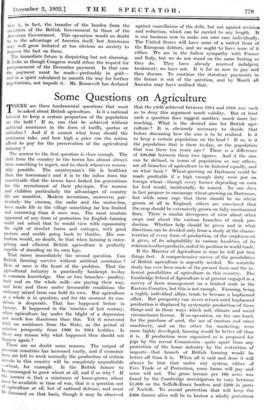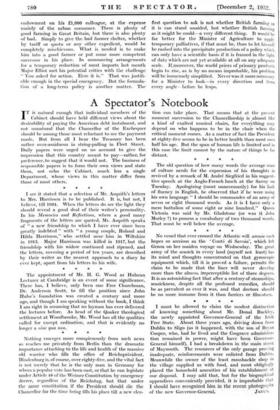Some Questions on Agriculture
THERE are three fundamental questions that must be asked about British agriculture. Is it a national interest to keep a certain proportion of the population on the laird ? If so, can that be achieved without artificial assistance in the form of tariffs, quotas or subsidies ? And if it cannot what form should the assistance take, and how high a price can the nation afford to pay for the preservation of the agricultural industry ?
The answer to the first question is clear enough. The drift from the country to the towns has almost always been something to regret, and to check whenever reason- ably possible. The countryman's life is healthier than the townsman's and it is to the influx from the countryside that the towns have looked for generations for the recruitment of their physique. For women and children particularly the advantages of country life are manifest. Modern inventions, moreover, par- ticularly the cinema, the radio and the motor-bus, have made life in the village something far less limited and narrowing than it once was. The most resolute opponent of any form of protection for English farming could not admit that he would view with equanimity the sight of derelict farms and cottages, with good pasture and arable going back to thistles. His con- tention would, no doubt, be that when farming is enter- prising and efficient British agriculture is perfectly capable of standing on its own legs.
That raises immediately the second question. Can British farming survive without artificial assistance ? Here at once is the heart of the problem. That the agricultural industry is practically bankrupt to-day is common knowledge. One or two branches—poultry, fruit and on the whole milk—are paying their way, and here and there under favourable conditions the ordinary mixed farm can hold its own. But agriculture as a whole is in question, and for the moment its con- dition is desperate. That has happened before in history. It happened in the 'nineties of last century, when agriculture lay under the blight of a depression not much less disastrous than this. Yet it recovered with no assistance from the State, as the period of relative prosperity from 1900 to 1914 testifies. Is there any reason why what happened then should not happen again ?
There are no doubt some reasons. The output of overseas countries has increased vastly, and if economic laws are left to work normally the production of certain cereals in this country will be completely unprofitable —wheat, for example. Is the British farmer to be encouraged to grow wheat at all, and if so why ? If the answer is that a minimum of home-grown wheat must be available in time of war, that is a question not of agriculture at all, but of national defence, and must be discussed on that basis, though it may be observed that the yield achieved between 1914 and 1918 was such as to deny this argument much validity. But at least such a question does suggest another, much more far- reaching. What is the desired aim for British agri- culture ? It is obviously necessary to decide that before discussing how the aim is to be realized. Is it to keep a certain population on the land ? If so, is it the population that is there to-day, or the population that was there ten years ago ? There is a difference of 100,000 between these two figures. And if the aim can be defined, in terms of population or any others, are all branches of agriculture to be fostered equally, and on what basis ? Wheat-growing on Dartmoor could be made profitable if a high enough duty were put on foreign wheat—though every farmer depending on corn for feed would, incidentally, be ruined. No one does in fact propose to encourage wheat-growing on Dartmoor, but while some urge that there should be no wheat grown at all in England, others are convinced that the crop should be extensively grown on fully mechanized lines. There is similar divergence of view about other crops and about the various branches of stock pro- duction. Whether help should be given and in what directions can be decided only from a study of the charac- teristics of every form of production, of the employment it gives, of its adaptability to various localities, of its relation to other products, and of its position in world trade.
If the Minister of Agriculture is wise he will put first things first. A comprehensive survey of the possibilities of British agriculture is urgently needed. No scientific study has ever been made of the present form and the in- herent possibilities of agriculture in this country. The Cambridge School of Agriculture is at present engaged in a survey of farm management on a limited scale in the Eastern Counties, but this is not enough. Farming, being a highly individual affair, tends to become a haphazard affair. But prosperity can never return until haphazard production is displaced by systematic production of those things and in those ways which soil, climate and social circumstance favour. If co-operation, on the one hand, for the purchase of seed, the use of tractors and other machinery, and on the other for marketing, were more highly developed, farming would be better off than it is. If production were organized as is proposed for pigs by the recent Commission—quite apart from any protection of the home industry by the restriction of imports—that branch of British farming would be better off than it is. When all is said and done it will always be true that under any system, either of Free Trade or of Protection, some farms will pay and some will not. The gross income per 100 acres was found by. the Cambridge investigators to vary between £1,000 on the Suffolk-Essex borders and 1400 in parts of Norfolk, To accord protection that will keep the £400 farmer alive will be to bestow a wholly gratuitous endowment on his £1,000 colleague, at the expense mainly of the urban consumer. There is plenty of good farming in Great Britain, but there is also plenty of bad. Simply to give the bad farther shelter, whether by tariff or quota or any other expedient, would be completely mischieVous. What is needed is to make him into a good farmer or put some more. competent. successor in his place. In announcing arrangements for a temporary reduction of meat imports last month Major Elliot met his potential critics with the challenge "You asked fOr action. Here it is." That was justifi- able enough in the special emergency. But the formula- tion of a long-term policy is another matter. The first question to ask is not whether British farming as it is can stand unaided, but whether British farming as it might be could—a very different thing. It would be• far better for the Minister of Agriculture to apply temporary palliatives, if that must be, than to let himself be rushed into the precipitate production of a policy which, can only. ave a scientific basis if it is framed in the light of data which are not yet available at all on any adequate scale. If,moreover, the world prices, of primary products begin to rise, as is by no means improbable, his problem will be immensely simplified. Never was it more necessary for a Minister to look—in every direction and from every angle—before he leaps.











































 Previous page
Previous page